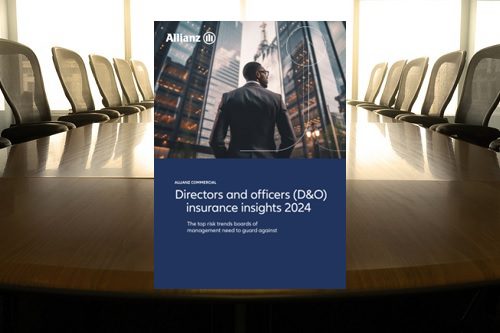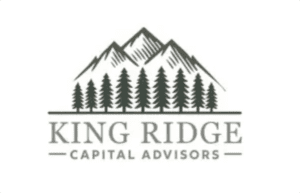Allianz report highlights key risk trends for Directors and Officers in 2024

Allianz Commercial report identifies trends for risk managers and brokers in the Directors and Officers (D&O) insurance spaceOngoing inflation, refinancing and insolvency pressures, and geopolitical and ESG issues are some of the headwind’s D&Os need to be prepared forGenAI-related risks could bring claims from several different areasD&O insurance market still competitive, but the impact of class actions, higher defence costs, regulatory scrutiny, an active plaintiff’s bar, and litigation funders means loss potential remains high.
DOWNLOAD REPORT HERE
Board members and company executives can be held liable for an increasing number of scenarios. Inadequate responses to economic pressures, geopolitical issues, implementing innovative technologies such as GenAI, or environmental, social, and governance (ESG) challenges are among the main factors driving the possibility that a company and its Directors and Officers (D&Os) may be sued in 2024, according to Allianz Commercial’s D&O insurance report.
“Buyers of D&O insurance from public and private companies have benefited from favourable pricing and broader coverage through 2023, helped by factors such as new market entrants and the stable trend in US securities class action filings,” explains Vanessa Maxwell, Global Head of Financial Lines at Allianz Commercial. “However, there is still a lot of risk facing D&Os and their insurers. Inflation continues to bite, influencing future claims through larger settlement values – at a 10-year high – and greater defence costs. The higher cost of refinancing debt is proving a shock. Insolvencies are rising, geopolitical uncertainty is considerable, cyber risk is elevated, and ESG claims are here to stay and proving challenging. D&Os need to be prepared for these headwinds and have a strategy that can adapt when presented with a block to the business. Diversity in the boardroom allows companies to have varied approaches to such problems.”
Gloomy outlook prevails
Since the world eased out of lockdown from the Covid-19 pandemic, a new normal has not made daily challenges for companies any easier. Economic growth across the globe remains disappointing. Business insolvencies are expected to rise by +10% in 2024, according to Allianz analysis. Inflationary pressures remain and refinancing of existing debt after years of low interest rates is a new test for many. D&Os are seeing fresh pressure on cash generation, and decisions around how companies finance capital expenditure and manage their debt profiles are under more scrutiny from stakeholders, the report notes.
In addition, businesses and their supply chains face considerable geopolitical risks with war in Ukraine, conflict in the Middle East, and ongoing tensions around the world. Political risk in 2023 was at a five-year high, with some 100 countries considered at high or extreme risk of civil unrest, according to analyst Verisk Maplecroft, meaning there is greater pressure and scrutiny on directors to ensure their company is adequately prepared to withstand the impact of business interruption in higher-risk territories, in addition to ensuring the safety of its employees.
Everyone is talking about GenAI
GenAI (generative artificial intelligence) describes algorithms that are utilized to create complex content, mimicking human activity. Discussion around its utilization has been building as the expanse in its capabilities is now impacting how corporations think about their business processes. A third of organizations are using it regularly in at least one business function, according to a McKinsey global survey.
“AI’s potential to create competitive advantages is exciting but there are also challenges with its adoption that companies should consider, such as threats to cyber security, increased regulatory risk, unrealistic investor expectations about its capabilities, as well as managing misinformation,” explains Hannah Tindal, a Regional Head of Commercial D&O at Allianz Commercial.
Litigation recently filed against AI companies has already highlighted privacy risks and copyright law violations. These cases, as well as the challenges noted above, have the potential to bring securities claims, intellectual property claims, breach of fiduciary duty claims, misrepresentation claims and shareholder and derivative lawsuits.
“Organizations can mitigate the risks associated with GenAI technologies by setting up best practices and deploying agile methods to keep governance, compliance protocols and legal frameworks current and able to adapt to the technology as it evolves,” says Tindal. “Close monitoring of AI’s evolution should be a high priority on the boardroom agenda.”
ESG claims from both sides
Regulatory action or litigation risks due to ESG-related issues are another major concern for boards, driven by increasing reporting and disclosure requirements around such topics, which could trigger claims in case of an inadequate response or non-compliance. The number of countries introducing ESG-reporting mandates has grown considerably in recent years, exposing directors to costs to responding to investigations, enforcement actions, and potential fines and penalties, for suspected non-disclosure or misrepresentation. Such requirements also expose directors to claims by private litigants, not only for alleged misrepresentation but also due to dissatisfaction with what the required disclosures reveal about a company’s commitments to ESG issues. Recent examples of claims have included allegations of failure to manage climate risk to alleged breach of duties by investing in underperforming funds that actively pursued ESG strategies.
“Not every stakeholder holds the same view on an issue or the same view as to what actions directors should take,” says David Ackerman, Head of Global Financial Lines Claims, Allianz Commercial. “In a world that is becoming increasingly polarized, politically and socially, the very need for directors to evaluate and address the impact of various ESG factors on corporate value creates risk that claims will be made, by activist shareholders or other motivated stakeholders, on either or both sides of any given issue.”
Fallout from the US banking crisis
The report also looks at the fallout from the March 2023 banking crisis in the US. Poor practices and rising interest rates resulted in several banks being dissolved or taken over. Securities fraud claims followed. An interesting aspect of this crisis was the role of social media. The depositors of one of the failed banks, Silicon Valley, were largely tech and healthcare startups, invested in by venture capitalists. When depositors started to withdraw funds, some venture capitalists advised their clients to start spreading their assets to other banks. This advice hit social media leading to a run on the bank, which closed shortly after. The power of social media to get large numbers of people to act in the same way at the same time means that bank runs can now happen too quickly to stop. It is also a reminder for D&Os how rapidly social media can exacerbate a crisis, the report notes.
Authored by Allianz





